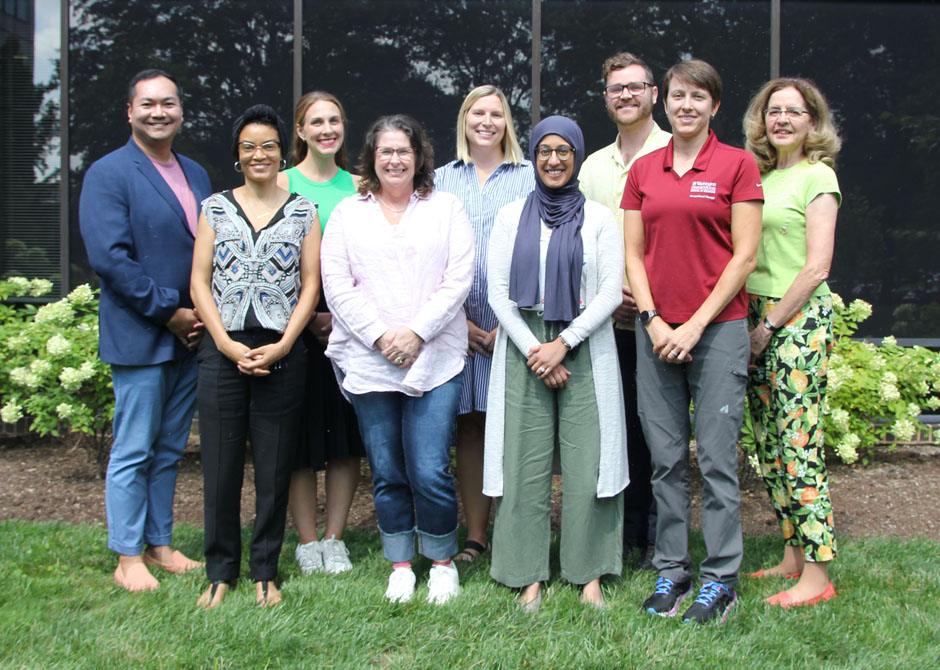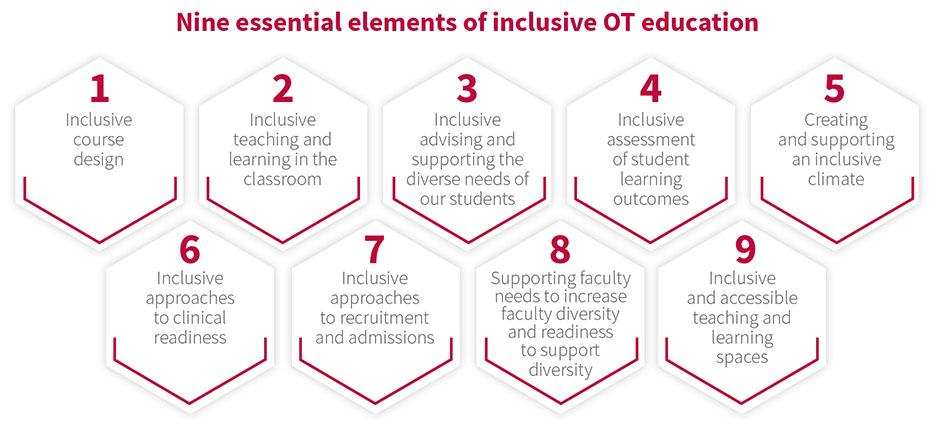Rehabilitation and Participation Science
Program in Occupational Therapy
by Michele Berhorst • September 28, 2023

The iOTE Committee (left to right): Lenin Grajo, Stacy West-Bruce, Amanda Mack, Carla Walker, Quinn Tyminski, Salma Bachelani, Grayson Owens, Sue Tucker and Kathy Kniepmann.
When Lenin Grajo, PhD, OTR/L, became the director for the Education Division and associate director of diversity, equity and inclusion (DEI) for the Program in 2022, one of his top priorities was to create a task force to strengthen the Program’s commitment to DEI, justice and anti-racism initiatives. He formed and co-chairs the Inclusive Occupational Therapy Education (iOTE) Committee, a group of nine faculty members and student representatives from the WashU Student OT Association and the WashU chapter of the Coalition of OT Advocates for Diversity who share his passion for enhanced inclusivity and focus on anti-racism. Through a strategic and intentional first-phase planning process, a guiding document is being developed: “The Essential Elements of Inclusive OT Education.”
“This is a living, breathing and dynamic document. We're approaching it with intentionality and purpose,” explains committee co-chair Stacy West-Bruce, OTD, MSW, OTR/L. “It will guide our collaborative work with faculty, staff and students, but it can change, evolve and adapt as we move through the iOTE program process.” After meeting monthly for a year, the committee drafted nine essential elements critical to committing to and driving the transformation through the education pipeline (see chart below).
“Many, if not all, of the items came about through an iterative faculty feedback process. Each element starts with our shared values, what we are currently doing, and then what we are committed to doing,” Grajo shares. “We are determining what is a pragmatic, reasonable expectation for faculty and staff accountability to this guide.”
In phase two of the iOTE program plan, the committee will be converted to three smaller working groups to facilitate a 12-month implementation of the program. One of the working groups, led by Salma Bachelani, OTD, OTR/L, with Grayson Owens, OTD, OTR/L, and Grajo as team members, aims to create a faculty fidelity checklist.
Grajo explains: “The faculty fidelity checklist is essentially a DEI+ audit making sure that DEI+ principles are at the core of how we prepare to teach, how we teach, how we measure teaching, and how we give feedback to students. It's a guide for faculty to see what their strong points are and which areas they need to do better in to make their teaching and learning spaces more inclusive, accessible and anti-racist. The Student Experiences Survey, which was first disseminated and drafted by the Program Evaluation Committee in fall 2022, will build on an existing Sense of Belonging Survey for students to assess feelings of belongingness and satisfaction within the program. Student representatives will be involved in the process.”
The case study working group, led by Kathy Kniepmann, OTD, MPH, EdM, CHES, OTR/L, with team members Sue Tucker, OTD, OTR/L, ATP, Quinn Tyminksi, OTD, OTR/L, BCMH, and Carla Walker, OTD, OTR/L, ATP, will serve a dual purpose: to create a guiding rubric so that all case studies follow inclusive and anti-racist principles of teaching and to provide a consultation and feedback group where faculty can submit their existing case studies for brainstorming on how they can better reflect those inclusive and anti-racist principles.
“From the start, we tell students that the clients you work with are humans first before they are patients. Before, it was the problem first: ‘Patient X is a 64-year-old Black male who had a stroke.’ We want to shift how we present cases to: ‘This person is a single father living in a rural neighborhood’ before introducing the medical diagnosis. This will then shift the way students look at the clients they interact with as a person with occupational and intersecting social identities before they are a medical case,” Grajo says.
“We also talk about cultural humility, which is this idea that, at the end of the day, you're basically just two people sitting across from each other learning about the other. It removes some of the pressure for us to have to be experts. Instead, it allows the people that we're serving to be the experts on their lives and for us to be curious,” West-Bruce adds. “It can be more of an exchange between two humans rather than an expert and a patient.”
The faculty professional development working group, co-led by West-Bruce and Amanda Mack, OTD, OTR/L, CLC, will be tasked with seeking experts and consultants who can provide training and support for faculty and staff to continue their professional development toward the enhanced ability to teach and support students using inclusive and anti-racist practices.
“Faculty and staff development will be key to the program’s success. Last spring, the committee sent out a faculty survey asking where they felt the gaps are around DEI, justice, and anti-racism and what types of training they would like,” West-Bruce says. “Essential elements of survey responses and the gaps that the committee has identified will be used to create these trainings.”
The third and final phase of the iOTE program will be evaluation. The committee will develop tools with two overarching goals in mind: to evaluate the program’s ongoing progress related to both faculty and student development. The evaluation is planned for the end of the 2024 spring semester.
While enhanced inclusivity and anti-racism is a priority for the Program, the goal is to make “The Essential Elements of Inclusive OT Education” available digitally as an accessible resource for OT educators and the profession. “This document is not about what we do or have done about this shared value and core mission. This document is about what we want to really hold ourselves accountable to, our core commitment to the communities we serve,” Grajo says.

We welcome inquiries from prospective students, potential collaborators, community partners, alumni and others who want to connect with us. Please complete the form below to begin the conversation.
Schedule an Info Session
We are excited that you are considering applying to the Program in Occupational Therapy at Washington University. Please join us for a Zoom Information Session for either our entry-level MSOT or OTD degrees or our online Post-Professional OTD. Current faculty members will discuss the degree program and answer any question you may have. We are offering these sessions on the following days and times. The content is the same for each one, so you only need to sign up for one.
Upcoming ENTRY-LEVEL Degree ZOOM Info sessions:
Schedule an Entry-Level Info Session
Upcoming PP-OTD Degree ZOOM Info session: